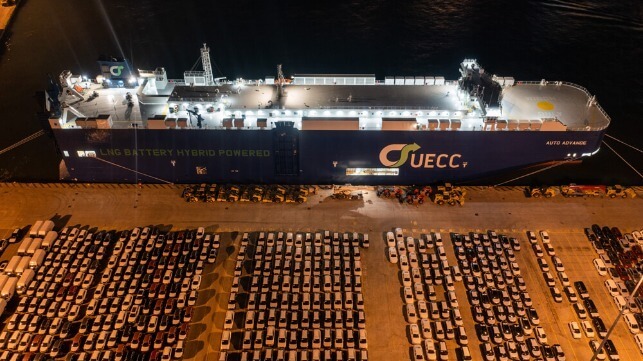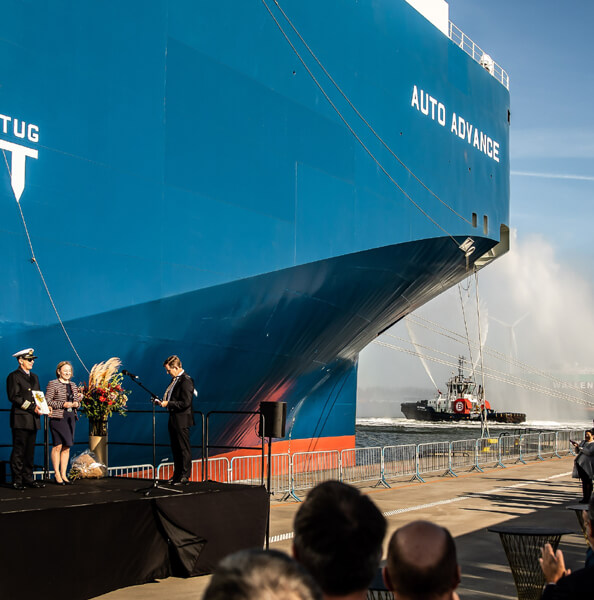UECC Sets Example with Three Multi-Fuel Battery Hybrid PCTCs

Short-sea European transport company UECC took the opportunity this week to celebrate the naming of its new multi-fuel LNG battery hybrid vessels as it took delivery of the third of the vessels built in China and marked the operation of the first two in Europe. The company is at the forefront of the transition to greener vessels and believes that its efforts will serve as a model for the broader shipping industry.
UECC’s newbuild trio of multi-fuel LNG battery hybrid PCTCs “will make a real difference for the environment and for business” as new green regulations are set to shift the market playing field, said Glenn Edvardsen, CEO of UECC during a naming ceremony for the company’s flagship Auto Advance this week in Zeebrugge, Belgium.
Edvardsen told the audience during the event that he believes the shipping industry can only advance to make progress toward decarbonization by deciding to move in a different direction. He highlighted that UECC’s owners and board of directors had done just that more than a decade ago beginning investments in newbuilds and alternative low-carbon fuels to drastically reduce the company’s emissions profile.
“By putting the environment at the top of its corporate agenda, UECC has taken industry leadership in response to the climate challenge,” he said. “Growing market demands for green operations and new environmental regulations will radically change the way we do business in the future.”
The first of the three 11,300 dwt vessel, Auto Advance, has been trading in Northern European waters for the past year following delivery last November from China’s Jiangnan Shipyard. The vessels are 555 feet long with a capacity of 3,580 cars and are registered in Portugal. The second of the vessels, Auto Achieve, arrived in Europe in mid-August 2022 and has now entered service. The third ship, Auto Aspire, was delivered on October 20 and she was named in a virtual ceremony while the Auto Advance was also formally named by Rosemary Lister, Head of Raw Material, Indirect and Supply Chain Purchasing at Toyota Motor Europe, at the October 26 ceremony.

Christening ceremony for Auto Advance this week in Belgium (UECC)
The three are the first vessels of their kind to be brought into operation, combining a multi-fuel LNG engine with a hybrid battery solution and smart energy management system in an innovative configuration designed for reduced fuel consumption and energy efficiency. According to UECC, all three PCTCs already exceed the IMO requirement for a 40 percent reduction in carbon intensity by 2030.
They were developed by UECC together with Jiangnan’s in-house design institute, as well as Wallenius Marine and NYK, in what was described by Edvardsen as “a triumph of engineering, teamwork, and international cooperation.”
“This could not have been achieved without the hard work, dedication, and expertise of the entire workforce at Jiangnan Shipyard and the UECC design and site team that consisted of Wallenius Marine, NYK, and UECC people, who had to overcome difficulties with lockdowns due to the Covid-19 pandemic to keep construction of the vessels on track,” he said.
Edvardsen points to new regulations saying that they will shift the market playing field in favor of environment-focused operators amid increasing demands from cargo owners and charterers for a more sustainable logistics chain. He points out that the cost of running ships on conventional marine fuels in Europe is set to increase with the removal of a tax exemption on bunker suppliers in the EEA from next year under the Energy Taxation Directive. Pollutive ships will also be increasingly penalized with the expected extension of the EU’s Emissions Trading System to shipping from 2024. He says the new regulations could add as much as 50 percent to the cost of fossil fuel,
“With new IMO carbon intensity regulations just around the corner and the looming prospect of higher costs for using conventional marine fuel, we are convinced that our timely investments in these newbuilds will make a real difference for the environment and for business. That is called sustainability progress,” Edvardsen concluded.
